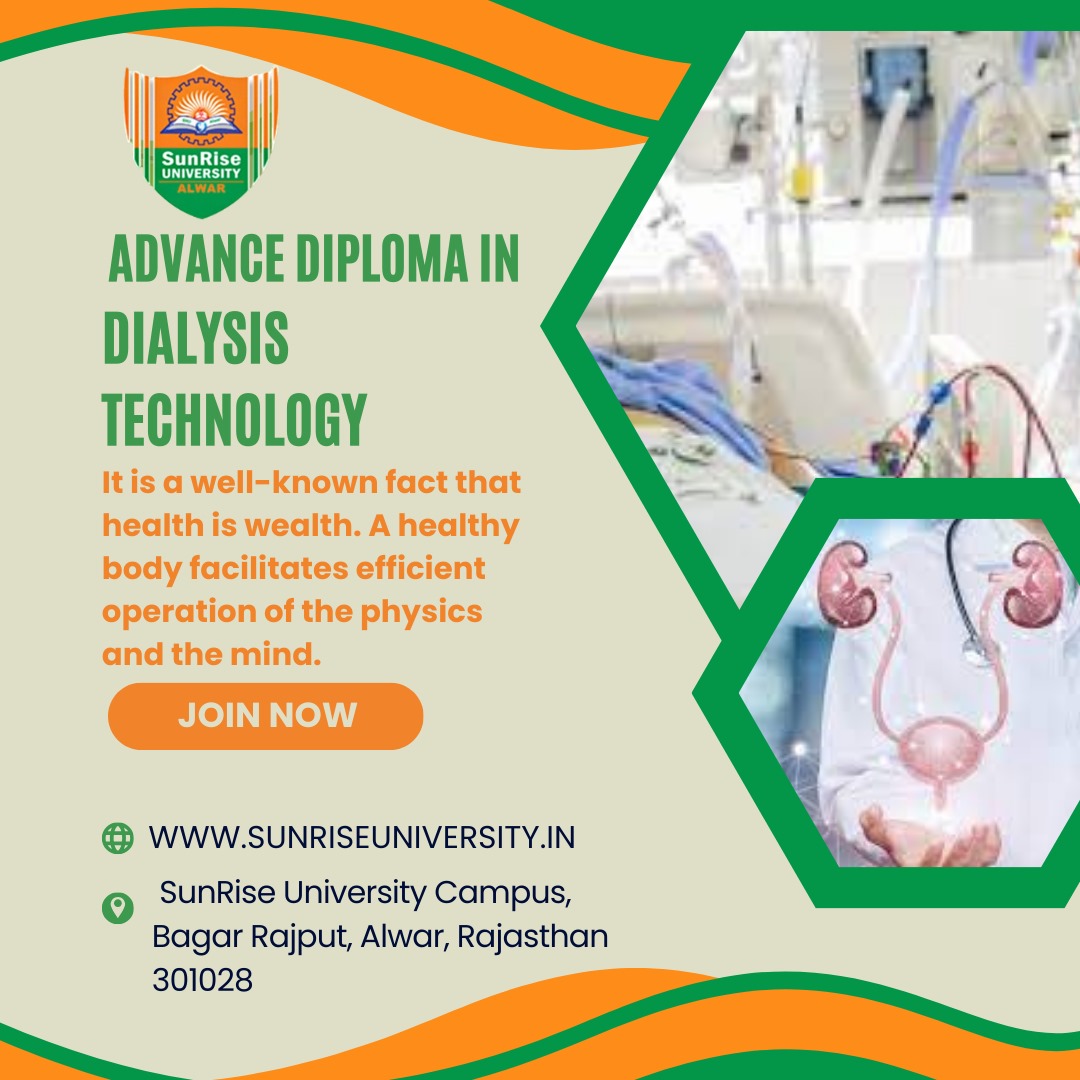Introduction about Advanced Diploma in Dialysis Technology
Sunrise University: ADVANCE DIPLOMA IN DIALYSIS TECHNOLOGY
Introduction, Admission, Eligibility, Duration
Welcome to the Advanced Diploma in Dialysis Technology program. This specialized course is designed by the best University of India to equip individuals with the necessary skills and knowledge to become proficient dialysis technicians in the healthcare industry. Dialysis technology plays a critical role in the treatment of patients with renal failure, enabling them to maintain a quality life despite compromised kidney function.
How can I apply for admission to Advanced Diploma in Dialysis Technology?
To apply for Advance Diploma in Dialysis Technology admission 2024-25, you typically need to follow these steps:
Research Programs: Start by researching institutions that offer advanced diploma programs in Dialysis Technology. Look for accredited institutions with a good reputation in healthcare education.
Review Admission Requirements: Each institution may have its own set of admission requirements. Typically, you'll need to have completed a relevant diploma or degree in healthcare or a related field. Some programs may also require specific prerequisite courses or healthcare experience.
Prepare Required Documents: Gather all necessary documents for the application process. This may include transcripts, certificates, letters of recommendation, a resume or CV, and a statement of purpose or personal statement.
Submit Application: Complete the application form for the program you're interested in. Make sure to provide accurate and complete information. Some institutions may have online application portals, while others may require paper applications sent by mail.
Pay Application Fee: Many institutions require an application fee to process your application. Make sure to pay this fee according to the instructions provided by the institution.
Attend Interviews (if required): Some programs may require you to attend an interview as part of the admission process. Prepare for the interview by reviewing common interview questions and practicing your responses.
Wait for Notification: After submitting your application, you'll need to wait for the institution to review it. They will notify you of their decision regarding your admission status. This may take several weeks, so be patient.
Acceptance and Enrolment: If you're accepted into the program, you'll typically receive an acceptance letter outlining the next steps for enrolment. Follow these instructions carefully to secure your spot in the program.
Financial Aid (if needed): If you require financial assistance, explore the options for scholarships, grants, or loans available through the institution or external sources. Make sure to submit any required financial aid applications by the deadlines provided.
Prepare for the Program: Once you've been accepted and enrolled, prepare for the program by familiarizing yourself with the curriculum, obtaining any required textbooks or materials, and making any necessary arrangements for housing or transportation.
What is the eligibility for Advanced Diploma in Dialysis Technology?
Eligibility criteria for an Advanced Diploma in Dialysis Technology can vary depending on the institution offering the program. However, typical eligibility requirements might include:
Educational Qualification: Candidates should have completed a relevant Bachelor's degree in fields such as Nursing, Medicine, Allied Health Sciences, or Biomedical Sciences from a recognized institution.
Minimum Aggregate Marks: Some institutions may require candidates to have a minimum aggregate score in their qualifying degree, typically around 50% to 60%.
Background Knowledge: Candidates may be required to have a background in science subjects such as Biology, Chemistry, and Physics.
Entrance Exam: Some institutions may conduct an entrance exam to assess the candidate's knowledge and aptitude for the program.
Work Experience: While not always mandatory, some institutions may prefer candidates with relevant work experience in healthcare settings, particularly in areas related to dialysis or patient care.
Language Proficiency: Proficiency in the language of instruction (often English) may be required, especially for non-native speakers. Some institutions may require candidates to demonstrate proficiency through standardized tests such as the TOEFL or IELTS.
How long does it take to complete Advanced Diploma in Dialysis Technology?
The duration of an Advance Diploma in Dialysis Technology program at the best University of India can vary depending on the educational institution and the specific curriculum they offer. Typically, such programs can last anywhere from 1 to 2 years, with some programs being full-time and others part-time. It's best to check with the institution offering the program for the most accurate information regarding the duration of their specific Advance Diploma in Dialysis Technology program.
Top of Form
Internship opportunities after Advanced Diploma in Dialysis Technology?
After completing an advanced diploma in Dialysis Technology, degree at the top University of India you can explore various internship opportunities in hospitals, clinics, dialysis centres, and healthcare facilities. Here are some potential internship options:
Hospital Dialysis Units: Many hospitals have dedicated dialysis units where you can intern under the supervision of experienced dialysis technicians and nurses. This will provide you with hands-on experience in operating dialysis machines, monitoring patients during dialysis sessions, and ensuring proper infection control procedures.
Dialysis Clinics: Dialysis clinics specialize in providing dialysis services to patients with kidney failure. Interning at a dialysis clinic will allow you to gain experience in managing dialysis procedures, handling patient assessments, and working with a multidisciplinary healthcare team.
Nephrology Departments: Some hospitals have specialized nephrology departments where you can intern alongside nephrologists, nurses, and other healthcare professionals. This experience will give you a broader understanding of kidney disease management and treatment options beyond dialysis.
Research Institutions: If you're interested in research, you may find internship opportunities at research institutions or universities conducting studies related to kidney disease, dialysis technology, or renal physiology. This can provide you with exposure to research methodologies, data analysis techniques, and advancements in the field of nephrology.
Pharmaceutical Companies: Pharmaceutical companies that manufacture dialysis equipment and supplies may offer internship programs where you can gain insights into product development, quality control processes, and regulatory requirements in the dialysis industry.
Community Health Centres: Some community health centres provide dialysis services to underserved populations. Interning at such centres can offer valuable experience in delivering dialysis care to diverse patient populations and addressing healthcare disparities.






